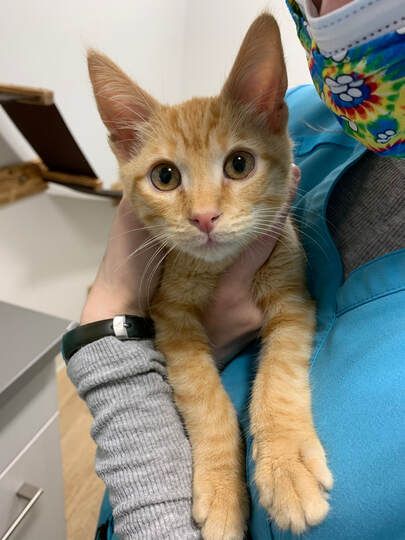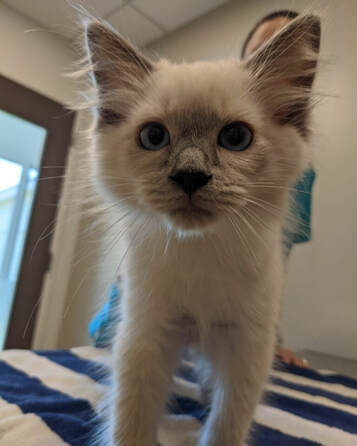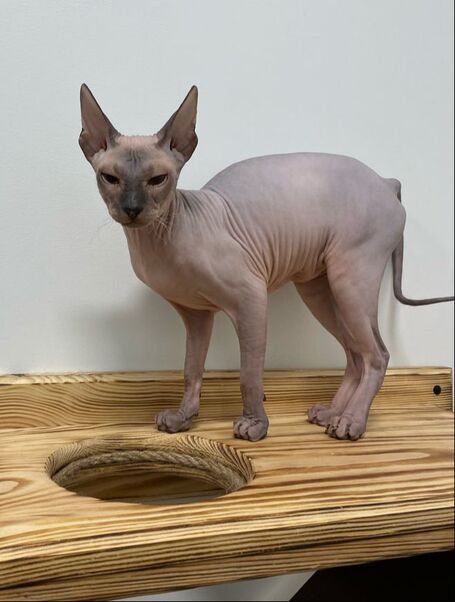|
If you’re about to adopt a new cat or are thinking about adding one to your family, let us be the first to say congratulations! And if you’ve recently adopted a new kitten and have a hundred different questions about what to do now, we’re here to help! Whether you’re a first-time cat owner looking for guidance, or a cat connoisseur looking to brush up on your pet-ownership expertise, here’s a handy list of questions, answers, and information you might find useful.
What is a Vaccine? A vaccine exposes the immune system to inactive or incomplete disease-causing agents to train it to quickly and effectively respond if it ever encounters the real deal. Typically we recommend vaccinating new kittens with the pankluemia, rhinotracheitis, and calvivirus (PRC) vaccine and the rabies vaccine. We may also recommend the feline leukemia vaccine for outdoor cats. Vaccines are safe and effective. Reactions are rare and not typically life threatening when treated properly. For more information on vaccine reactions, what to watch out for, and how to treat them, check out our April blog post. Fleas, Ticks, and Parasites, Oh My! Nobody wants fleas and ticks on their pets or in their homes. Fleas can transmit intestinal parasites, and while tick borne diseases like anaplasmosis are less common in cats than in dogs, they’re still possible. The good news is that flea and tick preventatives are safe, effective, and easy to give. We typically recommend topical preventatives like Revolution for cats, since cats are less likely to take a chewable tablet. We also advise continuing flea and tick preventatives year-round, as even in winter ticks can survive in temperatures as low as 33 degrees!
Spaying and Neutering In addition to preventing unwanted pregnancies, spaying and neutering your cats has a number of health benefits. Spayed females have a decreased risk of mammary cancer and a uterine infection known as pyometritis. Neutered males are less likely to run away, mark territory by urinating, or be attacked by other cats. They also have no risk of testicular cancer. Our veterinarians can help you decide whether spaying/neutering makes sense for your cat, and the best age at which to do so.  Protect your cat's beautiful smile with routine dental care! Protect your cat's beautiful smile with routine dental care! Caring for those Purr-ly Whites Let’s talk teeth! Much like humans, pets require dental care or they run the risk of plaque, tartar, gingivitis, and other periodontal diseases. Our veterinarians perform dental checkups as part of your cat’s annual visits, but you should brush your cat’s teeth at home as well! We recommend brushing daily, starting with short sessions to get your cat used to having their gums and teeth touched, before moving up to 3-5 minute sessions. For more info, check out our five-step video on cleaning your pet’s teeth. Microchipping Microchipping your pets is a safe, cost-effective way to dramatically increase the chances of finding a lost pet. A microchip is a small electronic device about the size of a grain of rice, implanted under the skin with a needle. If a lost pet is found and brought to a veterinarian or shelter they can scan for a chip, which can then be used to contact you. The microchipping process is about as painful as a normal vaccine and can be done at any routine visit, though we often implant them during sedated procedures such as neuters and spays. When to Call the Vet Over the lifetime of your cat, you’ll have moments where you wonder, Is this worth a phone call? At times like those remember the golden rule: When in doubt, always reach out. It’s what we’re here for, after all! You can call us at 978-369-3503, or email us at [email protected]. If you notice any of the following symptoms, call us or a 24-hour emergency vet immediately, as your cat may be experiencing a medical emergency:
That’s all very helpful, but…
As always, these blog posts are intended to provide general information about your pets. If you have questions not covered here or questions about your specific cat, feel free to get in touch! We’re always happy to have a quick cat chat. Comments are closed.
|
|
OFFICE HOURS:
Monday-Friday: 8:00 am to 6:00 pm Saturday: 8:00 am to 12:00 pm |
CONTACT INFORMATION:
Concord Animal Hospital 245 Baker Avenue Concord, MA 01742 Phone: (978) 369-3503 Fax: (978) 371-9748 [email protected] |
JOIN OUR PACK!
Sign up for our monthly newsletter, the Paw Press for hospital news, pet care tips and cute pet photos! |
Copyright © 2022


